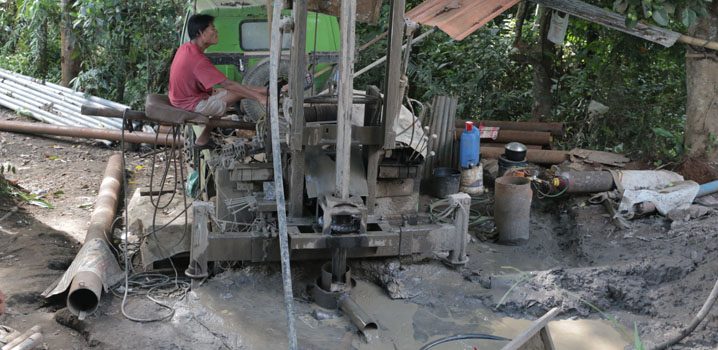 Water Shortage. With the leaking old asbestos pipes of their municipal water system, the Local Government Unit (LGU) of Cavinti, Laguna currently seeks to augment water volume at their main distribution tank with a deep-well pump. The leaks in the asbestos pipes, which were installed in the 1950’s, reduces the volume of water that reaches the tank, causing shortage of water supply in the town. (Photo by Kathrino V. Resurreccion, DA-PRDP NPCO InfoACE Unit)
Water Shortage. With the leaking old asbestos pipes of their municipal water system, the Local Government Unit (LGU) of Cavinti, Laguna currently seeks to augment water volume at their main distribution tank with a deep-well pump. The leaks in the asbestos pipes, which were installed in the 1950’s, reduces the volume of water that reaches the tank, causing shortage of water supply in the town. (Photo by Kathrino V. Resurreccion, DA-PRDP NPCO InfoACE Unit) DA replaces asbestos pipes in Laguna town water system
In a bid to provide accessible, adequate and safe water supply to both farming and non-farming residents of Cavinti town in Laguna, the Department of Agriculture’s Philippine Rural Development Project (DA-PRDP) has started the construction of the municipality’s new water system, replacing the worn-out and hazardous asbestos pipes.
Howard Miras, supervisor of the Cavinti waterworks office, said that the deterioration of the pipes, which were installed in the 1950’s, has recently become worse, making it more difficult and costlier for the local government unit (LGU) to conduct repairs.
Miras added that there have been recommendations for them to replace the asbestos pipes as the government has long banned the use of the material because of health hazards it poses.
Inhaling or ingesting asbestos fibers may cause mesothelioma, a rare, aggressive cancer that develops in the lining of certain organs or spaces within the body, known as the mesothelium. Symptoms, which appear after 20–50 years of exposure, are often similar to other diseases, leading to incorrect diagnosis.
But the Cavinti LGU is not only concerned with asbestos contamination but also with other harmful substances and germs that enter the deteriorating pipes.
“Our asbestos pipes have many leaks and these pass through rice fields and creeks. With these leaks, the water may become contaminated,” Miras explained.
Miras added that when these pipes are already replaced with PVC (polyvinyl chloride plastic) their apprehension of residents getting sick because of contaminated water will be gone.
“When the [friable] asbestos pipes will be replaced with PVC, contaminants can no longer permeate the water system,” Miras said.
Intermittent water supply
Some residents complain that recently, they have been experiencing unsteady water supply, leaving them with no option but to fetch water from nearby houses—sometimes even at midnight or at dawn—and wash their clothes in the river.
Miras explained that the current water system cannot provide continuous water supply to the whole municipality as the leaks on the asbestos pipes reduce the pressure, and consequently, the volume of water reaching the distribution tank.
“Each street has control valves where we control the flow of water—from four to eight hours at a time. There is no 24-hour supply of water here,” he said.
Miras said that this problem will be solved as the old pipes will be replaced by PVC pipes.
“In terms of design, the current system has a six-inches pipe from spring source to storage tank. With the PRDP subproject, the pipe diameter will be gradually reduced from the source to the distribution tank to build pressure,” Miras said.
Adelaida Valente, sanitation inspector of Barangay Poblacion said that with the subproject, residents can save money as they will no longer buy drinking water.
She explained that currently, residents do not drink from the tap; instead, they source drinking water from water refilling stations or directly from springs.
The P26.45 million-worth subproject will benefit about 2,620 households or 10,490 individuals. It is the second biggest PWS subproject under the PRDP, next to the P73.71-million PWS subproject in Luisiana, also in Laguna, which will benefit at least 4,735 households or 23,675 individuals. ### (Jan P. Dacumos, DA-PRDP NPCO InfoACE Unit)
